国际法翻译
- 格式:doc
- 大小:77.00 KB
- 文档页数:10
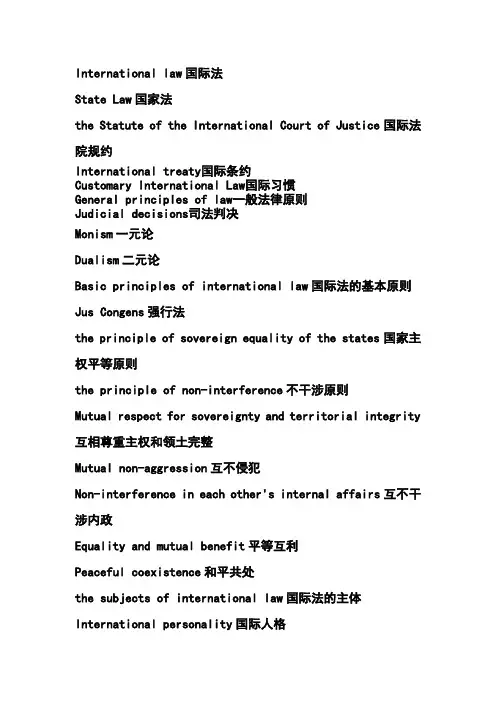
International law国际法State Law国家法the Statute of the International Court of Justice国际法院规约International treaty国际条约Customary International Law国际习惯General principles of law一般法律原则Judicial decisions司法判决Monism一元论Dualism二元论Basic principles of international law国际法的基本原则Jus Congens强行法the principle of sovereign equality of the states国家主权平等原则the principle of non-interference不干涉原则Mutual respect for sovereignty and territorial integrity 互相尊重主权和领土完整Mutual non-aggression互不侵犯Non-interference in each other's internal affairs互不干涉内政Equality and mutual benefit平等互利Peaceful coexistence和平共处the subjects of international law国际法的主体International personality国际人格Territory领土Residents居民Sovereignty主权Supreme authority最高权威Permanent neutralized state永久中立国Basic right and liability基本权利和义务Right of self-defense自卫权Jurisdiction管辖Immunities from jurisdiction管辖豁免International organization国际组织The nations struggling for their independence争取独立的民族the principles of self-determination of nations民族自决原则Individuals under international law国际法上的个人Recognition under international law国际法上的承认The constitutive theory构成说The declaratory theory宣告说The Succession继承Consent同意Counter-measure and self-defense反措施和自卫Force majeure and an accident不可抗力和偶然事故Severe distress, state of necessity危难和紧急情况Compensation赔偿Territorial sovereignty领土主权Condominium共管Leases租借Spheres of influence势力范围International servitudes国际地役Territorial waters领水Boundary river界河International river国际河流Occupation of terra nullius先占Accretion添付Prescription时效Cession 割让Conquest and annexation征服和吞并Self-determination of peoples人民自决The Antarctic南极The Arctic北极Nationality国籍Blood rule血统原则Right of the territory出生地原则Dual nationality双重国籍National treatment国民待遇Most-favored-nation treatment最惠国待遇Differential treatment差别待遇Diplomatic protection外交保护Effective and continuous nationality有效和持续国籍Exhaustion of local remedies用尽当地救济Extradition引渡Asylum庇护Double criminality principle双重归罪原则Principle of non-extradition of political offenders政治犯不引渡原则Normal baseline正常基线Straight baseline直线基线Internal waters内水Territorial Sea领海Right of innocent passage无害通过权Right of hot pursuit紧追权The Contiguous Zone毗连区the continental shelf大陆架Exclusive Economic Zone专属经济区High Sea公海Freedom of navigation航行自由Freedom of fishing捕鱼自由Freedom of flying飞越自由Archipelagos群岛水域The Area of the International Seabed国际海底区域Space Law空间法Airspace Law空气空间法Hijacking劫持飞机Either extradite or punish或引渡或起诉Outer space law外层空间法Diplomatic relations外交关系Consular relations领事关系Diplomatic privileges and immunities外交特权与豁免The immunity of diplomatic mission使馆豁免The consular privileges and immunities领事特权与豁免the Law of Treaties条约法Reservations保留Invalidity无效Termination, And Suspension of Treaties条约的终止和暂停施行the United Nations联合国The General Assembly大会The Security Council安理会Negotiation谈判Consultation协商Good offices斡旋Mediation调停Inquiry调查Conciliation和解Arbitration仲裁Judicial Methods司法解决。
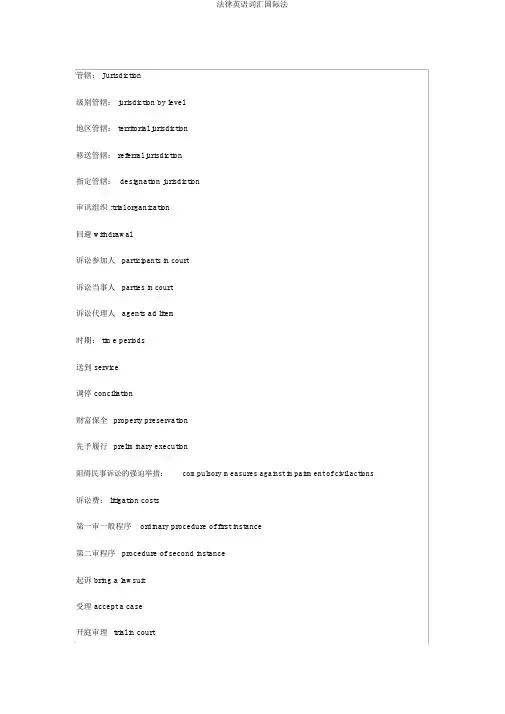
管辖: Jurisdiction级别管辖: jurisdiction by level地区管辖: territorial jurisdiction移送管辖: referral jurisdiction指定管辖: designation jurisdiction审讯组织 :trial organization回避 withdrawal诉讼参加人participants in court诉讼当事人parties in court诉讼代理人agents ad litem时期: time periods送到 service调停 conciliation财富保全property preservation先予履行preliminary execution阻碍民事诉讼的强迫举措:compulsory measures against impairment of civil actions 诉讼费: litigation costs第一审一般程序ordinary procedure of first instance第二审程序procedure of second instance起诉 bring a lawsuit受理 accept a case开庭审理trial in court诉讼中断 suspension of a lawsuit诉讼停止conclusion of a lawsuit判决 judgment裁定 order简略程序 summary procedure特别程序 special procedure选民资格案件cases concerning certificates of voters宣布失散proclamation of a person as missing宣布死亡proclamation of a person as dead无民事行为能力incompetent for civil conduct限制行为能力limited capacity for civil conduct无主财富property of ownerless履行申请 application for execution履行移转 referral of execution仲裁 arbitration司法辅助 judicial assistance案件case案件发回remand/remit a case(to a low court)案件名称title of a case模卷资料materials in the case案情陈说书statement of case案外人person other than involved in the case案值total value involved in the case败诉方losing party办案人员personnel handling a case保全举措申请书application for protective measures 报案report a case(to security authorities)被告defendant; the accused被告人最后陈说final statement of the accused被告向原告第二次争辩rejoinder被害人victim被害人的诉讼代理人victim's agent ad litem被上诉人respondent; the appellee被申请人respondent被申请履行人party against whom execution is filed 被履行人person subject to enforcement本诉principal action必需共同诉讼人party in necessary co-litigation变通管辖jurisdiction by accord辩白defense辩白律师defense attorney/lawyer辩白人defender辩白凭证exculpatory evidence; defense evidence争辩阶段stage of court debate驳回反诉dismiss a counterclaim; reject a counterclaim驳回恳求deny/dismiss a motion驳回上诉、保持原判reject/dismiss the appeal and sustain the original judgment/ruling驳回诉讼dismiss an action/suit驳回通知书notice of dismissal驳回自诉dismiss/reject a private prosecution驳回自诉裁定书ruling of dismissing private-prosecuting case增补争辩supplementary answer增补判决supplementary judgement增补侦察supplementary investigation不公然审理trial in camera不立案决定书written decision of no case-filing不同意拘捕决定书written decision of disapproving an arrest不起诉nol pros不予受理起诉通知书notice of dismissal of accusation by the court财富保全申请书application for attachment; application for property preservation 裁定order;determination(指最后裁定)裁定管辖jurisdiction by order裁定书order; ruling判决书award采信的凭证admitted evidence查封seal up撤回上诉withdraw appeal撤诉withdraw a lawsuit撤除立案revoke a case placed on file撤除原判,发回重审rescind the original judgement and remand the case ro the original court for retrial出示的凭证exhibit除权判决invalidating judgement(for negotiable instruments)传唤summon; call听说凭证hearsay争辩answer; reply争辩陈说书statement of defence争辩状answer; reply大法官associate justices; justice大检察官deputy chief procurator代理指控agency for accusation代理申述agency for appeal代理审讯员acting judge代为申请取保候审agency for application of the bail pending trial with restricted liberty of moving弹劾式诉讼accusatory procedure当事人陈说statement of the parties当庭宣判pronouncement of judgement or sentence in court地区管辖territorial jurisdiction地区检察分院inter-mediate People's Procuratorate第三人third party检查笔录record of investigation按期宣判pronouncement of judgement or sentence later on a fixed date定罪凭证incriminating evidence; inculpatory evidence冻结freeze敦促程序procedure of supervision and urge独任庭sole-judge bench独任仲减员sole arbitrator对阻碍民事诉讼的强迫举措compulsory measures against impairment of civil action 对席判决judgement interparties二审trial of second instance二审案件case of trial of second insurance罚款impose a fine法定凭证statutory legal evidence法定凭证制度system of legal evidence法官judges法警bailiff; court police法律文书legal instruments/papers法律救助legal aid法律咨询legal consulting法庭争辩court debate法庭检查court investigation法庭审理笔录court record法庭审理方式mode of court trial法庭庭长chief judge of a tribunal法院court法院通告court announcement反诉counterclaim反诉争辩状answer with counterclaim反诉状counterclaim犯法嫌疑人criminal suspect附加民事诉讼案件 a collateral civil action附加民事诉讼被告defendant of collateral civil action 复查reexamination;recheck复验reinspect高级法官senior judge高级检察官senior procurator高级人民法院Higher People's Court告诉案件case of complaint告诉才办理的案件case accepted at complaint告诉申述庭complaint and petition division工读学校work-study school for delinquent children公安部Ministry of Public Security公本分局public security sub-bureau公安厅public security bureau at the levels of provinces, autonomous regions and cities under direct jurisdiction of central government公然审理trial in public公然审讯制度open trial system公示催告程序procedure of public summons for exhortation公诉案件public-prosecuting case公诉词statement of public prosecution公证机关public notary office共同管辖concurrent jurisdiction管辖jurisdiction国际司法辅助international judicial assistance海事法院maritime court合议庭collegial panel合议庭评论笔录record of deliberating by the collegiate bench和解composition;compromise查对诉讼当事人身份check identity of litigious parties恢复履行resumption of execution回避withdrawal混淆式诉讼mixed action基层人民法院basic People's Court羁押限时term in custody级别管辖subject matter jurisdiction of courts at different levels监督居住living at home under surveillance牢狱prison检察官procurator检察权prosecutorial power检察委员会procuratorial/prosecutorial committee检察院procuratorate检察院派出机构outpost tribunal of procuratorate简略程序summary procedure判定结论expert conclusion经济审讯庭economic tribunal径行判决directad judication without sessions; judgement without notice 纠问式诉讼inquisitional proceedings拘传summon by force; summon by warrant拘禁所detention house检举information/report of an offence举证责任burden of proof; onus probandi决定书decision军事法院military procuratorate开庭审理open a courtsession开庭通知notice of courtsession勘验笔录record of inquest看守所detention house可履行财富executable property指控式诉讼accusatory proceedings控告凭证incriminating evidence控告职能accusation function扣押distrain on;attachment扣押物 distress/distraint宽容期period of gracepetition for labor dispute arbitration劳动争议仲裁申请书劳改场 reform-through-labor farm劳教所 reeducation-through-labor office类推判决的同意程序procedure for examination and approval of analogical sentence 积累凭证cumulative evidence立案报告place a case on file立案管辖functional jurisdiction立案决定书written decision of case-filing立案侦察report of placing a case on file利害关系人interested party暂时判决书interim award律师目睹书lawyer's written attestation; lawyer's written authentication律师事务所law office; law firm律师提早介入prior intervention by lawyer免于刑事处罚exemption from criminal penalty民事案件civil case民事审讯庭civil tribunal民事诉讼civil action民事诉讼法Civil Procedural Law扭送seize and deliver a suspect to the police派出法庭detached tribunal派出所police station判决judgement;determination判决书judgement;determination; verdict(指陪审团作出的)佐证circumstantial evidence陪审员juror同意拘捕approval of arrest破案clear up a criminal case; solve a criminal case破产bankruptcy;insolvency一般程序general/ordinary procedure一般管辖general jurisdiction公司法人破产还债程序procedure of bankruptcy and liquidation of a business corporation起诉filing of a lawsuit起诉sue; litigate;prosecute; institution of proceedings起诉状indictment;information区县检察院grassroots People's Procuratorate取保候审the bailpending trial with restricted liberty of moving缺席判决default judgement人民调停委员会People's Mediation Committee认定财富无主案件cases concerning determination of property as ownerless认定公民无民事行为能力、限制民事行为能力案件cases concerning determination of a citizen as incompetent or with limited disposing capacity上诉appeal上诉人appellant上诉状petition for appeal少管所juvenile prison社会治安综合治理comprehensive treatment of social security涉外案件cases involving foreign interests涉外民事诉讼foreign civil proceedings涉外刑事诉讼foreign criminal proceedings申请人applicant; petitioner申请书petition; application for arbitration申请履行人execution applicant申述人起誓书claimant's affidavit of authenticity申述书appeal for revision; petition for revision神示凭证制度system of divinity evidence神示制度ordeal system审察案件case review审察并决定拘捕examine and decide arrest审察起诉阶段stage of review and prosecution审理通知书notice of hearing审讯长presiding judge审讯长宣布开庭presiding judge announce court in session 审讯管辖 adjudgement/trial jurisdiction审讯监察程序procedure for trial supervision审讯委员会judicial committee审讯员judge审讯式诉讼inquisitional proceedings奏效判决裁定legally effective judgement /order胜诉方winning party省市自治区检察院higher People's Procuratorate失散和死亡宣布declaration of disappearance and death 实(质)体凭证substantial evidence实物凭证tangible evidence实在凭证real evidence表示凭证demonstrative evidence视听凭证audio-visual evidence收留所collecting post; safe retreat首席大法官chief justice首席检察官chief procurator受害人的近家属victim's immediate family受理acceptance受理刑事案件审批表registration form of acceptance of criminal case受送到人the addressee书记员court clerk书记员宣读法庭纪律court clerk reads court rules书证documentary evidence司法部Ministry of Justice司法机关judicial organizatons司法警察judicial police司法局judicial bureau司法厅judicial bureau at the levels of provinces, autonomous regions, and cities under direct jurisdiction of central government司法辅助judicial assistance死缓的复核judicial review of death sentence with a retrieve极刑复核程序procedure for judicial review of death sentence极刑复核权competence for judicial review of death sentence送到service of process送到传票service of summons/subpoena送到诉状service of bill of complaint搜寻search诉 sue; suit; action;lawsuit诉前财富保全property attachment prior to lawsuit诉讼litigation;lawsuit; sue; action诉讼保全attachment诉讼参加人litigious participants诉讼代理人agent ad litem诉状complaint; bill of complaint; state of claim特别程序special procedures提起公诉institute a public prosecution铁路法院railway court铁路检察院railroad transport procuratorate庭审程序procedure of court trial通缉wanted for arrest投案appearance退回增补侦察return of a case for supplementary investigation拜托辩白entrusted defense未成年人法庭juvenile court无行政职务的法官associate judge无正当原因拒不到庭refuse to appear in court without due cause 无罪判决acquittal,finding of“ not guilty”人证material evidence先予履行申请书application for advanced execution先予履行advanced execution刑事案件criminal case刑事拘禁criminal detention刑事强迫拘禁criminal coercive/compulsory measures刑事审讯庭criminal tribunal刑事诉讼criminal proceedings刑事诉讼法Criminal Procedural Law刑事自诉状self-incriminating criminal complaint行政案件administrative case行政审讯庭administrative tribunal行政诉讼administrative proceedings行政诉讼法Administrative Procedural Law宣布失散、宣布死亡案件cases concerning the declaration of disappearance and death宣判笔录record of rendition of judgement选民资格案件cases concerning qualifications of voters咨询证人inquire/question a witness训斥reprimand讯问笔录record of interrogation咨询犯法嫌疑人interrogate criminal suspect言词凭证verbal evidence要求传唤证人申请书application for subpoena一裁终局arbitration award shall be final and binding一审trial of first instance一审案件case of trial of first instance应诉通知书notice of respondence to action有罪判决sentence ;finding of“ guilty”予审preliminary examinantion; pretrial原告plaintiff院长court president阅卷笔录record of(by lawyers)再审案件case of retrial再审申请书petition for retrial责令具结悔悟order to sign a statement of repentance债权人会议creditors' meeting侦察阶段investigation stage侦察终结conclusion of investigation征询原、被告最后建议consulting final opinion of the plaintiff and defendant 凭证evidence凭证保全preserve evidence凭证保全申请书application for evidence preservation证证人言testimony of witness; affidavit支付令payment order/warrant知识产权庭intellectual property tribunal履行程序procedure execution履行拘捕execution of arrest履行和解conciliation of execution履行展转recovery of execution履行庭executive tribunal履行异议objection to execution履行员executor履行中断discontinuanceof execution履行终结conclusion of execution指定辩白appointed defense指定仲减员申明statement of appointing arbitrator中级人民法院intermediate People's Court半途退庭retreat during court session without permission 仲裁arbitration仲裁被诉人respondent ;defendant仲裁判决award仲裁申请书arbitration仲裁申述人claimant ;plaintiff仲裁庭arbitration tribunal仲裁委员会arbitration committee仲裁协议arbitration agreement; clauses of arbitration仲减员arbitrator主诉检察官principal procurator助理检察官assistant procurator助理审讯员assistant judge特意法院special court特意管辖specific jurisdiction专属管辖exclusive jurisdiction追查刑事责任investigate for criminal responsibility自首confession to justice自诉案件private-prosecuting case自行辩白self-defense自由心证制度doctrine of discretional evaluation of evidence自侦案件 self-investigating case最高人民法院the Supreme People's Court最高人民检察院the Supreme People's Procuratorate最后判决书final awardbilateral and multilateral economic cooperation双边和多边经济合作bilateral trade双边贸易dual nationality两重国籍trusteeship托管束度outer space外层空间sole legal government独一合法政府loans with no or low interest无息和低息贷款colonialism and neo-colonialism新老殖民主义delayed repayment of capital and interest缓期还本付息extradition引渡Zionism犹太复国主义friendly exchanges友善来往disputed areas有争议的地区fishery resources渔业资源political offender政治犯political fugitive政治逃犯Middle East, Mideast中东neutral state ,neutral country中立国neutralized state永远中立国apartheid, racial segregation种族隔绝genocide种族灭绝sovereign state主权国家exclusive economic zone专属经济区suzerain state ,metropolitan state宗主国suzerainty宗主权to maintain neutrality保持中立to safeguard national sovereignty and national resources捍卫国家主权和民族资源to take concerted steps采纳协调行动to undertake obligations in respect of the nuclear-free zone对无核区肩负义务to develop relations of peace and friendship, equality and mutual benefit, andprolonged stability发展和平友善、同等互利、长久稳固的关系to develop the national economy发展民族经济to peddle munitions贩卖军械All countries, big or small, should be equal.国家不分大小,应当一律同等to establish normal state relations成立正常的国家关系to seek a fair and reasonable solution求得公正合理的解决to make up for each other's deficiencies扬长避短to negotiate through diplomatic channels经过外交门路进行谈判to safeguard national independence and the integrity of sovereignty保护国家独立和主权完好to safeguard world peace保护世界和平to solve disputes by peaceful means用和平局段解决争端in consideration of the actual conditions照料现真相况the Five Principles of Peaceful Coexistence和平共处五项原则mutual respect for sovereignty and territorial integrity相互尊敬主权和国土完好Mutual non-aggression各不相犯non-interference in each other's internal affairs互不干预内政equality and mutual benefit同等互利peaceful coexistence和平共处draft 法案 ,草案Government bill政府议案to pass a bill, to carry a bill经过议案to enact a law, to promulgate a law公布法律ratification, confirmation同意law enforcement法律的实行to come into force奏效decree法律clause条款minutes备忘录report判例汇编codification法律汇编legislation立法legislator立法者jurist法学家jurisprudence法学legitimation合法化legality, lawfulness法制,合法legal, lawful合法的,依法的to contravene a law, to infringe a law, to break a law违纪outlaw, outside the law高出法律范围的offender犯人to abolish撤消,撤消rescission, annulment取销,撤消repeal, revocation, annulment取销(法律) cancellation, annulment, invalidation取销(合同) cancellation (支票)作废annulment撤消 (遗言 )repeal rescission撤消(判决)revocation撤消immunity宽免 ,宽免权disability, legal incapacity无资格nonretroactive character不溯既往性prescription剥夺公权attainder公民权益的剥夺和财富的充公constitutional law宪法canon law教会法例common law习惯法criminal law刑法administrative law行政法civil law民法commercial law, mercantile law商法law of nations万国公法,国际法international law国际法natural law自然法labour laws劳工法fiscal law财政法Civil Suit Law, Code of civil law民事诉讼法Criminal Law刑事诉讼法Military Law军法Conscript Law兵役法Copyright Law著作权法penal code刑法典code of mercantile law商法典civil rights民事权益 ,公民权益right of asylum逃难权human rights, rights of man人权(customs) duties关税death duty, death tax遗产税royalties版税。
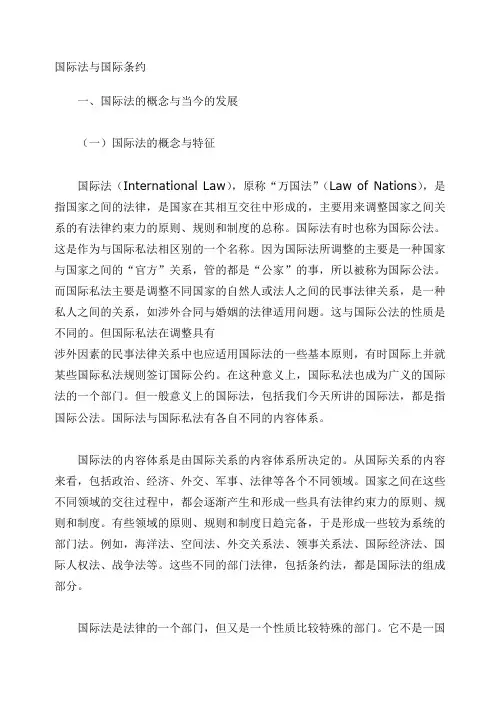
国际法与国际条约一、国际法的概念与当今的发展(一)国际法的概念与特征国际法(International Law),原称“万国法”(Law of Nations),是指国家之间的法律,是国家在其相互交往中形成的,主要用来调整国家之间关系的有法律约束力的原则、规则和制度的总称。
国际法有时也称为国际公法。
这是作为与国际私法相区别的一个名称。
因为国际法所调整的主要是一种国家与国家之间的“官方”关系,管的都是“公家”的事,所以被称为国际公法。
而国际私法主要是调整不同国家的自然人或法人之间的民事法律关系,是一种私人之间的关系,如涉外合同与婚姻的法律适用问题。
这与国际公法的性质是不同的。
但国际私法在调整具有涉外因素的民事法律关系中也应适用国际法的一些基本原则,有时国际上并就某些国际私法规则签订国际公约。
在这种意义上,国际私法也成为广义的国际法的一个部门。
但一般意义上的国际法,包括我们今天所讲的国际法,都是指国际公法。
国际法与国际私法有各自不同的内容体系。
国际法的内容体系是由国际关系的内容体系所决定的。
从国际关系的内容来看,包括政治、经济、外交、军事、法律等各个不同领域。
国家之间在这些不同领域的交往过程中,都会逐渐产生和形成一些具有法律约束力的原则、规则和制度。
有些领域的原则、规则和制度日趋完备,于是形成一些较为系统的部门法。
例如,海洋法、空间法、外交关系法、领事关系法、国际经济法、国际人权法、战争法等。
这些不同的部门法律,包括条约法,都是国际法的组成部分。
国际法是法律的一个部门,但又是一个性质比较特殊的部门。
它不是一国的法,而是国家间的法。
因此,与国内法相比较,它有一些不同于国内法的特征。
主要有以下三点:第一,国际法的主体与国内法的主体不同。
在国内法中,法律的主体,也就是法律关系的参加者和由此而产生的权利和义务的享有和承担者,除了国家外,还有自然人和法人,而且主要是自然人和法人。
但是,国际法的主体主要是国家,个人一般不是国际法主体。
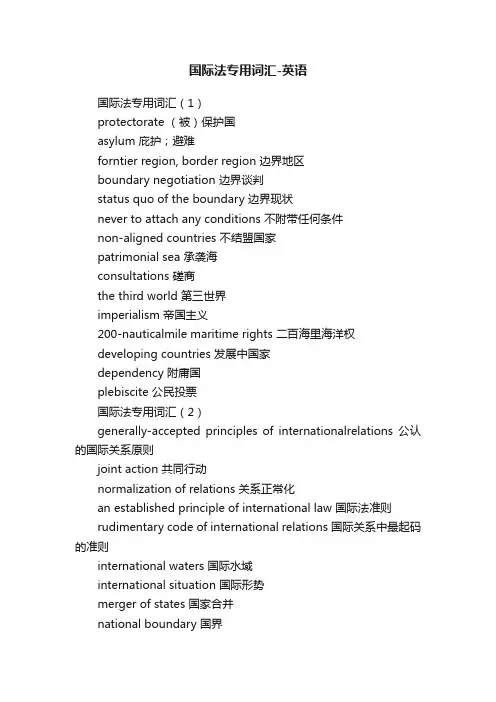
国际法专用词汇-英语国际法专用词汇(1)protectorate (被)保护国asylum 庇护;避难forntier region, border region 边界地区boundary negotiation 边界谈判status quo of the boundary 边界现状never to attach any conditions 不附带任何条件non-aligned countries 不结盟国家patrimonial sea 承袭海consultations 磋商the third world 第三世界imperialism 帝国主义200-nauticalmile maritime rights 二百海里海洋权developing countries 发展中国家dependency 附庸国plebiscite 公民投票国际法专用词汇(2)generally-accepted principles of internationalrelations 公认的国际关系原则joint action 共同行动normalization of relations 关系正常化an established principle of international law 国际法准则rudimentary code of international relations 国际关系中最起码的准则international waters 国际水域international situation 国际形势merger of states 国家合并national boundary 国界maritime resources 海洋资源mutual understanding and mutual accommodation 互谅互让exchange of needed goods 互通有无détente, 缓和fundamental rights 基本权利reduction or cancellation of debts 减轻债务负担国际法专用词汇(3)Near East 近东right of residence 居留权arms dealer, merchant of death 军火商territorial sea 领海limits of territorial sea 领海范围breadth of territorial sea 领海宽度territorial air 领空territorial waters 领水inalienability of territory 领土的不可割让性territorial jurisdiction 领土管辖权territorial contiguity 领土毗连territorial integrity 领土完整refugee camp 难民营country of one's residence 侨居国complete prohibition and thorough destruction of nuclear weapons 全面禁止和彻底销毁核武器people-to-people contacts and exchanges 人民之间的联系和交流sacred and inviolable 神圣不可侵犯ecocide 生态灭绝国际法专用词汇(四)practical, efficient, economical and convenient foruse 实用,有效,廉价,方便bilateral and multilateral economic cooperation 双边和多边经济合作bilateral trade 双边贸易dual nationality 双重国籍trusteeship 托管制度outer space 外层空间sole legal government 唯一合法政府loans with no or low interest 无息和低息贷款colonialism and neo-colonialism 新老殖民主义delayed repayment of capital and interest 延期还本付息extradition 引渡Zionism 犹太复国主义。
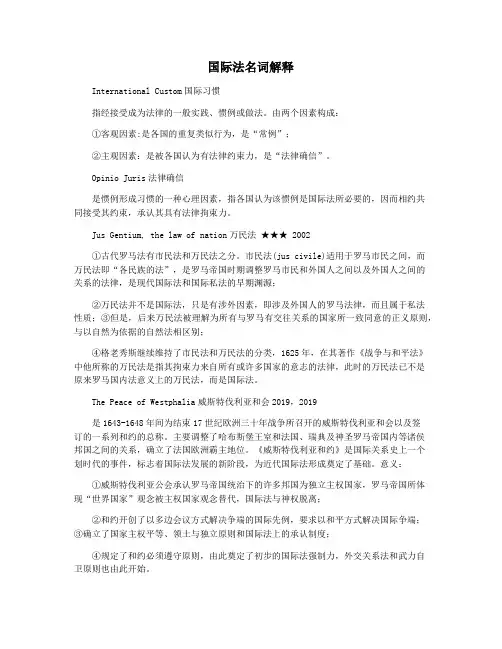
国际法名词解释International Custom国际习惯指经接受成为法律的一般实践、惯例或做法。
由两个因素构成:①客观因素:是各国的重复类似行为,是“常例”;②主观因素:是被各国认为有法律约束力,是“法律确信”。
Opinio Juris法律确信是惯例形成习惯的一种心理因素,指各国认为该惯例是国际法所必要的,因而相约共同接受其约束,承认其具有法律拘束力。
Jus Gentium, the law of nation万民法★★★ 2002①古代罗马法有市民法和万民法之分。
市民法(jus civile)适用于罗马市民之间,而万民法即“各民族的法”,是罗马帝国时期调整罗马市民和外国人之间以及外国人之间的关系的法律,是现代国际法和国际私法的早期渊源;②万民法并不是国际法,只是有涉外因素,即涉及外国人的罗马法律,而且属于私法性质;③但是,后来万民法被理解为所有与罗马有交往关系的国家所一致同意的正义原则,与以自然为依据的自然法相区别;④格老秀斯继续维持了市民法和万民法的分类,1625年,在其著作《战争与和平法》中他所称的万民法是指其拘束力来自所有或许多国家的意志的法律,此时的万民法已不是原来罗马国内法意义上的万民法,而是国际法。
The Peace of Westphalia威斯特伐利亚和会2019,2019是1643-1648年间为结束17世纪欧洲三十年战争所召开的威斯特伐利亚和会以及签订的一系列和约的总称。
主要调整了哈布斯堡王室和法国、瑞典及神圣罗马帝国内等诸侯邦国之间的关系,确立了法国欧洲霸主地位。
《威斯特伐利亚和约》是国际关系史上一个划时代的事件,标志着国际法发展的新阶段,为近代国际法形成奠定了基础。
意义:①威斯特伐利亚公会承认罗马帝国统治下的许多邦国为独立主权国家,罗马帝国所体现“世界国家”观念被主权国家观念替代,国际法与神权脱离;②和约开创了以多边会议方式解决争端的国际先例,要求以和平方式解决国际争端;③确立了国家主权平等、领土与独立原则和国际法上的承认制度;④规定了和约必须遵守原则,由此奠定了初步的国际法强制力,外交关系法和武力自卫原则也由此开始。
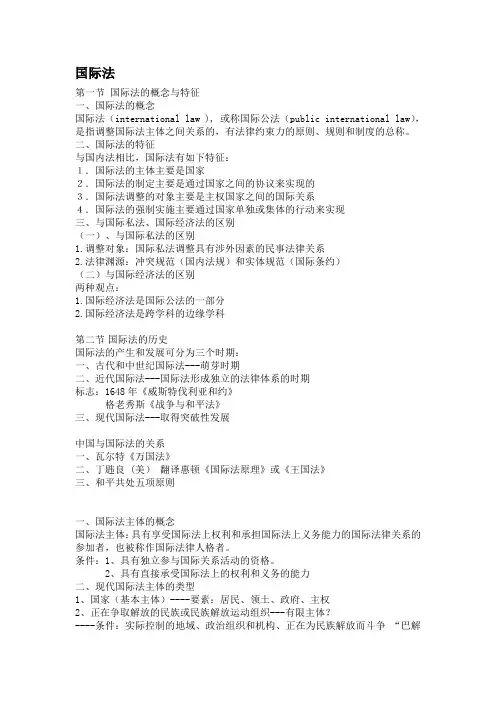
国际法第一节国际法的概念与特征一、国际法的概念国际法(international law ), 或称国际公法(public international law),是指调整国际法主体之间关系的,有法律约束力的原则、规则和制度的总称。
二、国际法的特征与国内法相比,国际法有如下特征:1.国际法的主体主要是国家2.国际法的制定主要是通过国家之间的协议来实现的3.国际法调整的对象主要是主权国家之间的国际关系4.国际法的强制实施主要通过国家单独或集体的行动来实现三、与国际私法、国际经济法的区别(一)、与国际私法的区别1.调整对象:国际私法调整具有涉外因素的民事法律关系2.法律渊源:冲突规范(国内法规)和实体规范(国际条约)(二)与国际经济法的区别两种观点:1.国际经济法是国际公法的一部分2.国际经济法是跨学科的边缘学科第二节国际法的历史国际法的产生和发展可分为三个时期:一、古代和中世纪国际法---萌芽时期二、近代国际法---国际法形成独立的法律体系的时期标志:1648年《威斯特伐利亚和约》格老秀斯《战争与和平法》三、现代国际法---取得突破性发展中国与国际法的关系一、瓦尔特《万国法》二、丁韪良 (美)翻译惠顿《国际法原理》或《王国法》三、和平共处五项原则一、国际法主体的概念国际法主体:具有享受国际法上权利和承担国际法上义务能力的国际法律关系的参加者,也被称作国际法律人格者。
条件:1、具有独立参与国际关系活动的资格。
2、具有直接承受国际法上的权利和义务的能力二、现代国际法主体的类型1、国家(基本主体)----要素:居民、领土、政府、主权2、正在争取解放的民族或民族解放运动组织---有限主体?----条件:实际控制的地域、政治组织和机构、正在为民族解放而斗争“巴解组织”3、国际组织4、个人(争议)国际上犯罪第四节国际法的渊源国际法渊源:国际法规范表现的形式或形式的过程、程序。
意义:1、国际法规则的查找和确定2、国际法规则有效性的确定1、普通或特别国际条约2、国际习惯3、一般法律原则国际条约:指两个或两个以上国际法主体之间缔结的,以国际法为准的,规定当事方权利、义务的协议。
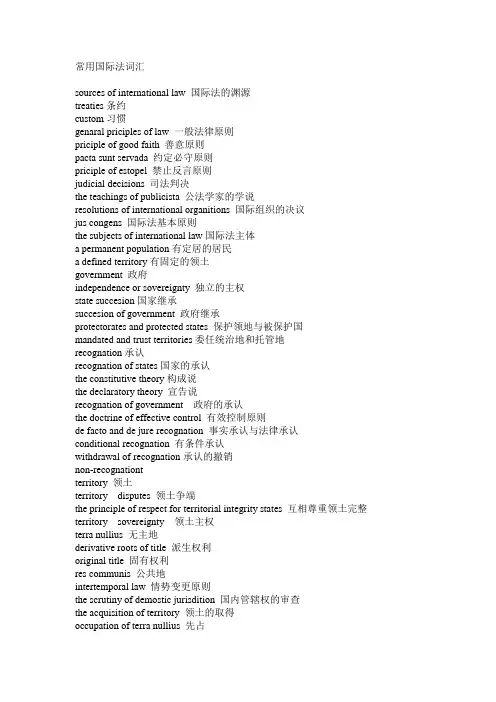
常用国际法词汇sources of international law 国际法的渊源treaties条约custom习惯genaral priciples of law 一般法律原则priciple of good faith 善意原则pacta sunt servada 约定必守原则priciple of estopel 禁止反言原则judicial decisions 司法判决the teachings of publicista 公法学家的学说resolutions of international organitions 国际组织的决议jus congens 国际法基本原则the subjects of international law国际法主体a permanent population有定居的居民a defined territory有固定的领土government 政府independence or sovereignty 独立的主权state succesion国家继承succesion of government 政府继承protectorates and protected states 保护领地与被保护国mandated and trust territories委任统治地和托管地recognation承认recognation of states国家的承认the constitutive theory构成说the declaratory theory 宣告说recognation of government 政府的承认the doctrine of effective control 有效控制原则de facto and de jure recognation 事实承认与法律承认conditional recognation 有条件承认withdrawal of recognation承认的撤销non-recognationtterritory 领土territory disputes 领土争端the principle of respect for territorial integrity states 互相尊重领土完整territory sovereignty 领土主权terra nullius 无主地derivative roots of title 派生权利original title 固有权利res communis 公共地intertemporal law 情势变更原则the scrutiny of demostic jurisdition 国内管辖权的审查the acquisition of territory 领土的取得occupation of terra nullius 先占prescription 时效cession 割让accreetion 添附subjugation or conquest 征服effective occupation 有效占领assert the sovereign right to the territory 主张领土主权the principle of contiguity 临近原则the principle of continuity 连续性原则null and viod 无效self-defense 自卫the transformation of the course of a river 河流改道the median line between the two banks 河流中心线the middle line of the navigable channel 航道中心线adjudication司法裁定the doctrine of uti possidetis 先占原则lease 租借servitude 国际地役jurisdiction 管辖权legislative juridiction 立法管辖权executive juridiction 行政管辖权judicial juridiction 司法管辖权apprehension 逮捕the host state 东道国civil juridiction 民事管辖权criminal juridiction 行使管辖权the common law countries 普通法系国家the continental law countries 大陆法系国家the defendant 被告the territoral principle 领土原则the protective principle 保护原则the nationality principle 国际原则the passive personality principle 被动人格原则the universality principle 普遍性原则flag state 船旗国manslaughter 过失杀人jus sanguinis 血统原则jus soli 出生地原则naturalization 归化piracy 海盗行为slave trading 奴隶贸易international terrorist activities 国际恐怖主义活动organized crimes 有组织犯罪war crimes 战争罪concentration camps 集中营abduct 绑架international criminal juridiction mechanism国际刑事司法体制extradition 引渡take refuge 避难asylum 庇护extraterritorial asylum 域外庇护diplomatis asylum 外交庇护immunities from jurisdiction 管辖豁免state immunity 国家的豁免absolute immunity 绝对豁免restrictive immunity 有限豁免requisitioned ship 被征用的船舶writ 令状governmental acts(acts jure imperili) 公务行为private or trade activity(acts jure gestionis) 私人行为immunity of foreign military personnel 外国军事人员的豁免the indigenous people 当地居民diplomatic privileges and immunities 外交特权与豁免diplomatic staffs 外交人员personal reprisenation 个人代表说extraterritoriality 治外法权说functional necessity 职务需要说persona non grata 不受欢迎的人the diplomatic mission 外交使团the premises of the diplomatic mission 使馆馆舍consular immunity 领事豁免state responsibility 国家责任international obligation 国际义务internationally wrongful act 国际不法行为fault 过错objective responsibility 客观责任原则subjective responsibility 主观责任原则intentional and negligent 故意和过失ultra vires acts 越权行为due dilgence 适当注意satisfaction 赔礼道歉the treatment of aliens 外国人待遇international mminimum standard 国际标准原则national treatment standard 国民待遇dual nationality 双重国籍exhaustion of local remidies 用尽当地救济expel aliens 驱逐外国人on the international plane 在国际上the law of treaties 条约法termination of wars 结束战争an expression of concurring wills 同意的意思表示concurring wills attributable to two or more parties 两方或多方的一致意愿concluded between subjects of international law 在国际法主体之间缔结an intention to produce lagal effects 产生法律效果的意愿lagal effects under public international law受国际法调整的法律效果unilateral statement 单方面声明a concessionary contract 特许契约negotiation 谈判signature 签署ratification 批准accession 加入entry into force 生效reservations to treaties 条约的保留the bilateral treat 双边条约the mullateral treaty 多边条约explicity forbid 明令禁止pacta sunt sevenda 条约必须信守原则non-retroactivity 不溯及既往原则territorial application 领土全境适用原则the amendment and mosification of treaties 条约的修正与修改treaty interpretation 条约的解释preamble and annexes 序言和附件invalidity of treaties 条约的无效fraud and corruption 欺诈和贿赂coercion 胁迫termination of treaties 条约的中止material breach 实质性违反peaceful settlement of disputes 和平解决争端air law and space law 航空法与空间法territorial airspace 领空the privilege to fly across the territory of another contracting state without landing 不降停飞跃另一缔约国领土的权利the privilege to land for non-traffic purposes 在另一缔约国做非商业性降停的权利upper limits for liability 最高责任上限aviation security 航空安全unauthorized aerial intrusion 未经授权进入他国领空的行为the law of outer space 外层空间法the law of the sea 海洋法the doctrine of freedom of the seas 公海自由理论baselines 基线internal waters 内水bays 海湾archipelago 群岛archipelagic waters 群岛水域rights of innocent passage 无害通过权international straits 国际海峡the contiguous zone 毗连区the exclusive economic zone(EEZ)专属经济区the continental shelf 大陆架the high seas 公海flag of convenience 方便旗hot pursit 紧追权seaworthiness 适航性environmental protection 环境法the balance of nature 自然平衡ozene depletion 臭氧层破坏acid rain 酸雨global warming 全球变暖human rights 人权法specialized international agreement 专门领域的国际公约the right to life生存权freedom from torture,inhuman or degrading treatment and punishment不受酷刑、非人道或有辱人格的待遇和惩罚freedom from slavery and forced labor 免受奴隶贸易和被迫劳动the right of justice 接受公正审判的权利respect for privacy and family life 对隐私和家庭生活的尊重ill-treatment虐待peaceful settlement of disputes 争端的和平解决negotiation谈判good offices斡旋mediation调停inquiry调查conciliation 调解arbitration 仲裁judicial settlement 司法解决ad hoc judge 专案法官non-appesrance 缺席advisory opinions 咨询意见the use of force 使用武力retorsion反报retaliation报复reprisals 报复self-defense自卫self-determination 自决humanitarian intervention 非人道干预civil conflicts国内冲突international organizations国际组织the league of nations 国联the United Nations 联合国GATT and WTO关贸总协定和世贸组织EU欧盟OAS美洲国家组织ASEAN 东盟the Arab League阿拉伯国家联盟。
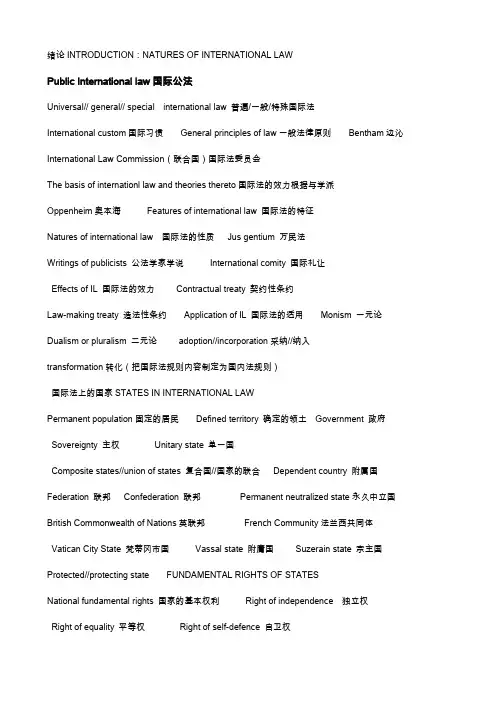
绪论INTRODUCTION:NATURES OF INTERNATIONAL LAWPublic International law国际公法Universal// general// special international law 普遍/一般/特殊国际法International custom国际习惯General principles of law一般法律原则Bentham边沁International Law Commission(联合国)国际法委员会The basis of internationl law and theories thereto国际法的效力根据与学派Oppenheim奥本海Features of international law 国际法的特征Natures of international law 国际法的性质Jus gentium 万民法Writings of publicists 公法学家学说International comity 国际礼让Effects of IL 国际法的效力Contractual treaty 契约性条约Law-making treaty 造法性条约Application of IL 国际法的适用Monism 一元论Dualism or pluralism 二元论adoption//incorporation采纳//纳入transformation转化(把国际法规则内容制定为国内法规则)国际法上的国家STATES IN INTERNATIONAL LAWPermanent population固定的居民Defined territory 确定的领土Government 政府Sovereignty 主权Unitary state 单一国Composite states//union of states 复合国//国家的联合Dependent country 附属国Federation 联邦Confederation 联邦Permanent neutralized state永久中立国British Commonwealth of Nations英联邦French Community法兰西共同体Vatican City State 梵蒂冈市国Vassal state 附庸国Suzerain state 宗主国Protected//protecting state FUNDAMENTAL RIGHTS OF STATESNational fundamental rights 国家的基本权利Right of independence 独立权Right of equality 平等权Right of self-defence 自卫权Right of self-preservation自保权Right of jurisdiction 管辖权Territorial jurisdiction /jurisdiction based on residence?属地管辖Personal jurisdiction/jurisdiction based on citizenship 属人管辖Protective jurisdiction 保护性管辖Universal jurisdiction 普遍管辖State immunity 国家豁免权The doctrine of absolute immunity绝对豁免原则The doctrine of relative or restrictive immunity 相对豁免原则RECOGNITION AND SUCCESSIONrecognition of states and governments国家和政府的承认States succession 国家继承Constitutive theory 构成说Declaratory theory 宣告说De jure recognition 法律上承认De facto recognition 事实上承认Effective control 有效统治Principle of effectiveness 有效统治原则Recognition of national liberation movement民族解放运动组织的承认Insurgent body 叛乱团体Belligerent body 交战团体Personal treaty 人身条约dispositive//non-personal treaties非人身条约The clean s/plate rule 白板规则State property 国家财产State debt 国家债务Localized state debt 地方化债务State archives 国家档案The principle of non-recognition不承认原则国际争端法PEACEFUL SETTLEMENT OF INTERNATIONAL DISPUTESthe principle of peaceful settlement of international disputesPolitical methods //legal methods of settlementsregional agencies or arrangements区域机关和区域办法International Court of Justice国际法院Voluntary jurisdiction自愿管辖Conventional jurisdiction协定管辖Optional compulsory jurisdiction任意强制管辖retortion 反报reprisals 报复negotiation 谈判consultation 协商inquiry//investigation 调查good offices 斡旋mediation 调停conciliation 和解//调解The Permanent Court of Arbitration 常设仲裁法院judicial settlement 司法解决Permanent Court of International Justice 国际常设法院pacific blockade 平时封锁dispute-settlement mechanisms of…justiciable//non-justiciable disputeamicable//compulsive settlement和谐//强迫解决方法Institution of proceedings起诉written//oral proceedings书面//口头程序memorial 诉状counter-memorial 反诉状reply 答辩 a third party 第三方国际条约法THE LAW OF TREATIESconclusion and entry into force of treatiespacta sunt servanda 约定必须信守application and interpretation of treaties适用与解释条约amendment, termination, suspen-sion of operation 条约的修改、终止与停止执行invalidity of treaties条约的无效convention公//专约treaty条约agreement 协定charter 宪章covenant ,statute 盟约、规约(general//final) act (总//最后)文件(additional//final )protocol(附加//最后)议定书exchange of notes 换文negotiation 谈判initiating草签(full) signature 签署accession 加入sanction of treaty 核准ratification, acceptance, approval批准、接受、赞同treaty-making capacity 缔约能力treaty-making power 缔约权treaty-making right 缔约权利full power 全权证书reservation 保留amendment/modification修正/改memorandum of understanding谅解备忘录declaration 宣言joint declaration//statement 联合声明joint communique 联合公报constitution 组织宪章arrangement 补充协定authentication 认证provisional application 暂时适用constitutionalism 宪法主义学派internationalism 国际主义学派material breach 重大违约fundamental change of circumstances 情势根本变更国际组织法administrational union(国际行政联盟)League of Nations(国际联盟)United Nations FamilyOriginal/elective memberUnited Nations CharterRegional International OrganizationsSpecialized Agencies(联合国专门机构)Privileges and Immunities of…International Economic Organizations and their institutionsThe Collective Security System(联合国集体安全体制)The UN Peace-keeping Operations(联合国维和行动)European Unionthe principle of unanimity of great powers大国一致原则primary responsibility 主要责任the forum of the world世界论坛organ of action行动的机关provisional measures 临时办法call upon 促请preventive diplomacy 预防性外交the proportionality rule相称性原则humanitarian intervention人道主义干预protectorate (被)保护国asylum 庇护;避难forntier region, border region 边界地区boundary negotiation 边界谈判status quo of the boundary 边界现状never to attach any conditions 不附带任何条件non-aligned countries 不结盟国家patrimonial sea 承袭海consultations 磋商the third world 第三世界imperialism 帝国主义200-nauticalmile maritime rights 二百海里海洋权developing countries 发展中国家dependency 附庸国plebiscite 公民投票generally-accepted principles of international relations 公认的国际关系原则joint action 共同行动normalization of relations 关系正常化an established principle of international law 国际法准则rudimentary code of international relations 国际关系中最起码的准则international waters 国际水域international situation 国际形势merger of states 国家合并national boundary 国界maritime resources 海洋资源mutual understanding and mutual accommodation 互谅互让exchange of needed goods 互通有无détente, 缓和fundamental rights 基本权利reduction or cancellation of debts 减轻债务负担Near East 近东right of residence 居留权arms dealer, merchant of death 军火商territorial sea 领海limits of territorial sea 领海范围breadth of territorial sea 领海宽度territorial air 领空territorial waters 领水inalienability of territory 领土的不可割让性territorial jurisdiction 领土管辖权territorial contiguity 领土毗连territorial integrity 领土完整refugee camp 难民营country of one's residence 侨居国complete prohibition and thorough destruction of nuclear weapons 全面禁止和彻底销毁核武器people-to-people contacts and exchanges 人民之间的联系和交流sacred and inviolable 神圣不可侵犯ecocide 生态灭绝practical, efficient, economical and convenient for use 实用,有效,廉价,方便bilateral and multilateral economic cooperation 双边和多边经济合作bilateral trade 双边贸易dual nationality 双重国籍trusteeship 托管制度outer space 外层空间sole legal government 唯一合法政府loans with no or low interest 无息和低息贷款colonialism and neo-colonialism 新老殖民主义delayed repayment of capital and interest 延期还本付息extradition 引渡Zionism 犹太复国主义friendly exchanges 友好往来disputed areas 有争议的地区fishery resources 渔业资源political offender 政治犯political fugitive 政治逃犯Middle East, Mideast 中东neutral state, neutral country 中立国neutralized state 永久中立国apartheid, racial segregation 种族隔离genocide 种族灭绝sovereign state 主权国家exclusive economic zone 专属经济区suzerain state, metropolitan state 宗主国suzerainty 宗主权to maintain neutrality 保持中立to safeguard national sovereignty and national resources 保卫国家主权和民族资源to take concerted steps 采取协调行动to undertake obligations in respect of the nuclear-free zone 对无核区承担义务to develop relations of peace and friendship, equality and mutual benefit, and prolonged stability 发展和平友好、平等互利、长期稳定的关系to develop the national economy 发展民族经济to peddle munitions 贩卖军火All countries, big or small, should be equal. 国家不分大小,应该一律平等to establish normal state relations 建立正常的国家关系to seek a fair and reasonable solution 求得公平合理的解决to make up for each other's deficiencies 取长补短to negotiate through diplomatic channels通过外交途径进行谈判to safeguard national independence and the integrity of sovereignty维护国家独立和主权完整to safeguard world peace 维护世界和平to solve disputes by peaceful means 用和平手段解决争端in consideration of the actual conditions 照顾现实情况the Five Principles of Peaceful Coexistence 和平共处五项原则mutual respect for sovereignty and territorial integrity互相尊重主权和领土完整mutual non-aggression 互不侵犯non-interference in each other's internal affairs 互不干涉内政equality and mutual benefit 平等互利WelcomeTo Download!!!欢迎您的下载,资料仅供参考!。
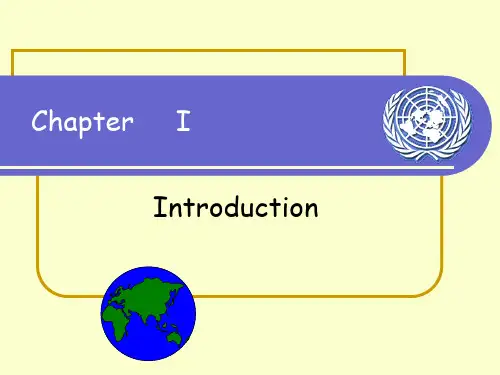
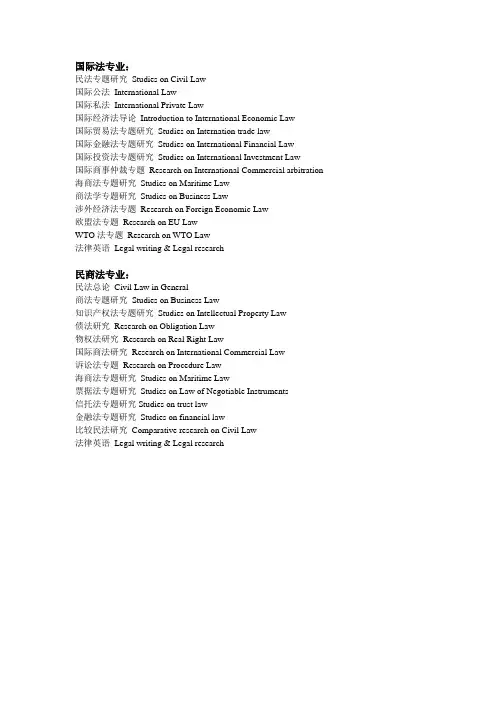
国际法专业:民法专题研究Studies on Civil Law国际公法International Law国际私法International Private Law国际经济法导论Introduction to International Economic Law国际贸易法专题研究Studies on Internation trade law国际金融法专题研究Studies on International Financial Law国际投资法专题研究Studies on International Investment Law国际商事仲裁专题Research on International Commercial arbitration 海商法专题研究Studies on Maritime Law商法学专题研究Studies on Business Law涉外经济法专题Research on Foreign Economic Law欧盟法专题Research on EU LawWTO法专题Research on WTO Law法律英语Legal writing & Legal research民商法专业:民法总论Civil Law in General商法专题研究Studies on Business Law知识产权法专题研究Studies on Intellectual Property Law债法研究Research on Obligation Law物权法研究Research on Real Right Law国际商法研究Research on International Commercial Law诉讼法专题Research on Procedure Law海商法专题研究Studies on Maritime Law票据法专题研究Studies on Law of Negotiable Instruments信托法专题研究Studies on trust law金融法专题研究Studies on financial law比较民法研究Comparative research on Civil Law法律英语Legal writing & Legal research。
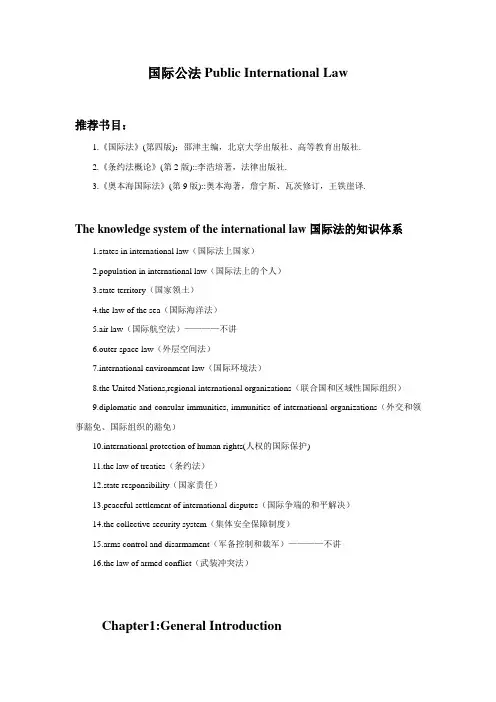
国际公法Public International Law推荐书目:1.《国际法》(第四版):邵津主编,北京大学出版社、高等教育出版社.2.《条约法概论》(第2版)::李浩培著,法律出版社.3.《奥本海国际法》(第9版)::奥本海著,詹宁斯、瓦茨修订,王铁崖译.The knowledge system of the international law国际法的知识体系1.states in international law(国际法上国家)2.population in international law(国际法上的个人)3.state territory(国家领土)4.the law of the sea(国际海洋法)5.air law(国际航空法)————不讲6.outer space law(外层空间法)7.international environment law(国际环境法)8.the United Nations,regional international organizations(联合国和区域性国际组织)9.diplomatic and consular immunities, immunities of international organizations(外交和领事豁免、国际组织的豁免)10.international protection of human rights(人权的国际保护)11.the law of treaties(条约法)12.state responsibility(国家责任)13.peaceful settlement of international disputes(国际争端的和平解决)14.the collective security system(集体安全保障制度)15.arms control and disarmament(军备控制和裁军)————不讲16.the law of armed conflict(武装冲突法)Chapter1:General Introduction一、国际法的概念the concept of international law我们可以从广义和狭义两个角度来把握,法是调整社会关系的规范,那么广义的国际法就是调整各种国际关系的规范的总称。
国际法international law 或称国际公法public international law p1 法律确信opinion juris p13一般承认ageneral recognition p13国际法的编纂codification p16国际法的效力根据the basis of international law p19条约必须信守原则pactasunt servanda p25属人/地最高权territorial/personal supremacy p31主权平等sovereign equality p33国家state p34永久性人口permanent population p34领土territory p35主权sovereignty p35单一国unitary state p36复合国composite state p36联邦federation p36邦联confederation p37永久中立国permanent neutralized state p37国家的基本权利fundamental rights p40独立权right of independence p40平等权right of equality p41自卫权right of self-defence p41管辖权right of jurisdiction p42属地管辖权territorial jurisdiction p42属人管辖权personal jurisdiction p42保护性管辖protective jurisdiction p43普遍管辖universal jurisdiction p44国家豁免state immunity p44国家的承认recognition of state p48法律的承认de jure recognition p52事实的承认de facto recognition p52政府的承认recognition of government p53有效统治原则principle of effectiveness p53民族解放组织的承认recognition of national movement p54叛乱团体insurgent body p54交战团体belligerent body p54国家的继承succession of state p55白板规则the clean plate rule p57国家财产state property p58国家债务state debt 又称公共债务public debt p59地方化国家债务localized state debt p59政府继承succession of government p60国籍nationality p64外国人alien p72国民待遇national treatment p75最惠国待遇most favoured nation treatment p75互惠待遇reciprocal treatment p76外交保护diplomatic protection p76实际国籍effective nationality p77国际持续原则doctrine of continuous nationality p77引渡extradition p81符合相同原则principle of identity p83特定原则principle of specialty p84庇护asylum p85难民refugee p90不推回原则non-refoulement p93国家领土state territory p95领土主权territorial sovereignty p95共管condominium p97租借leased territory p98国际地役international servitude p98领陆land territory p100领水territorial waters p100内水internal waters p100界河boundary river p100多国河流multi-national river p101国际河流international river p101湖泊或内陆海lake or inland sea p102通洋运河inter-oceanic canal p102领海territorial sea p104领空territorial airspace p104底层领土territorial subsoil p104先占occupation p105无主地terra nullius p105时效prescription p106添附accretion p106割让cession p107征服conquest p108民族自决self-determination of peoples p108全民公决referendum p109国家边界state boundary p109边境frontier region p110承认现状原则或保持占有原则the principle of uti possidetis juris p112 国际海洋法the international law of the sea p124内水internal waters p129海湾bays p129港口ports p130领海the territorial sea p130领海基线baseline p131无害通过权right of innocent passage p132毗连区contiguous zone p133用于国际航行的海峡straits used for international navigation p134群岛水域archipelagic waters p136群岛海道通过权right of archipelagic sea lanes passage p136和平通过权peaceful crossing right p137过境通过权transit crossing right p137专属经济区the exclusive economic zone p138大陆架continental shelf p141公海high seas p145登临权right of visit p149紧追权right of hot pursuit p150航空法air law p156领空territorial airspace p161过境通过权transit crossing right p169群岛海道通过权right of archipelagic sea lanes passage p169拦截interception p169业务权又称航权traffic right p1751、外层空间法(outer space law)P1932、预防原则(principle of prevention)P2303、共同但有区别的责任原则(common but differentiated responsibilities)P2314、国际组织(international organization)P2675、政府间的国际组织(inter-governmental organization)P2676、国际组织发(the law of international organizations)P2737、联合国专门机构(specialized agencies)P2858、区域性国际组织(ragional organizations)P2909、外交特权和豁免(diplomatic privileges and immunities)P29810、法外治权(extraterritoriality)P30011、代表性说(representative character)P30012、职务需要说(functional necessity)P30013、不受欢迎的人(persona non grata)P30814、领事馆(consular post)P31115、使馆(diplomatic mission)P311十三章397:convention 公约treaty协约agreement 协定charter covenant statute 宪章盟约规约act,genaral act or final act文件总文件或最后文件protocol 议定书exchange of notes 换文Memorandum of understanding 谅解备忘录398:declaration 宣言joint declaration,joint communique联合声明,联合公报ratification,acceptance,approval批准,接受,赞同402:accession条约的加入407:pacta sunt servanda条约必须信守十四章419:international wrongful acts 国际不法行为421:the act of state 国家行为424:consent同意self-defense自卫425:countermeasures反措施force majeure 不可抗力426:distress and state of necessity危难与危机情况427:continued duty to perform and cessation继续履约和停止不法行为428:non-repetition保证不重犯restitution恢复原状429:compensation:补偿satisfaction抵偿十五章433:international disputes国际争端434:amicable settlement和平解决435:retortion反报reprisals报复pacific blockade平时封锁intervention干涉440:investigation:调查,又称查询(inquiry)实况调查(fact-finding)441:good offices斡旋mediation调停442:conciliation和解444:arbitration仲裁446:the permanent court of arbitration条常设仲裁法院447: judicial settlement 司法解决448:permanent court of international justice国际常设法院449:international court of justice国际法院十六章468:protection of collective security集体安全保障individual security个体安全471:the principle of unanimity of great powers大国一致原则488:the proportionality rule相称性原则489:humanitarian intervention人道主义干涉十八章529:restriction限制原则proportion比例原则distinction区分原则neutrality中立原则military necessity军事必要原则。
Non-intervention in domestic affairs 不干涉内政International Cooperation 国际合作The Sources of International Law 国际法的渊源Codification of International Law 国际法的编纂国际强行法(jus cogens)International treaty 国际条约Law-making treaty 造法性条约Contractual treaty 契约性条约Bilateral treaties 双边条约Multilateral treaties 多边条约International Customary 国际习惯Fundamental principle of law 一般法律原则International judicial precedent 国际司法判例Codification of international law 国际法的编纂Subject of International Law 国际法的主体Territorial 领土Unitary State 单一国Composite State 复合国Federal State 联邦Confederated State 邦联Permanent neutralized state 永久中立国State Sovereignty 国家主权Right of jurisdiction 管辖权Right of universal jurisdiction 普遍性管辖权The state sovereignty immunity 国家主权豁免Internationally wrongful acts 国际不法行为International obligations 国际义务succession to asset 财产的继承archive档案Recognition 承认Nationality 国籍naturalization 归化National 国民National Treatment 国民待遇Most-favoured-nation Treatment 最惠国待遇differential treatment(差别待遇)reciprocal treatment(互惠待遇)边境(frontierpassport 护照Consular Jurisdiction 领事裁判权Diplomatic Protection 外交保护Exhaustion of Local Remendies Rule 用尽当地救济原则Referendum全民投票Extradition 引渡Double Criminality Principle 双重犯罪原则Asylum 庇护Territorial Asylum 域内庇护Extra-territorial Asylum 域外庇护Refugee 难民Territory 领土Territorial Sovereignty 领土主权Territorial Waters 领水Aerial Comain 领空prescription 时效cession 割让accretion添附occupation先占Conquest 征服Self-determination of peoples 民族自决Condominium 共管International Servitude 国际地役Sphere Influence 势力范围Lease租借Boundaries 国家边界Territorial Sea 领海Right of Innocent Passage 无害通过权Contiguous Zone 毗连区Exclusive Economic Zone 专属经济区Continental Shelf 大陆架Archipelagic Waters 群岛水域Flag of Convenience 方便旗Right of Visit 登临权Right of Pursuit 紧追权Transit Right 过境权Diplomatic relations 外交关系Consular relations 领事关系Diplomatic Privileges and Immunities 外交特权与豁免International Organization 国际组织The Charter of the United Nations 联合国宪章Security Council 安理会International Court of Justice 国际法院Negotioation 谈判Adoption 议定Ratification 批准Accession 加入Reservation 保留International Dispute 国际争端谈判(negotiation)Conciliation 协商Good Offices 斡旋Mediation 调停International Arbitration 国际仲裁judicial settlement 司法解决和解(conciliation)。
法律英语词汇:International law 国际法法律英语词汇:International law 国际法由站整理。
1. A state alone can perform acts of sovereignty on its territory.只有国家才能在本人的领土上行使主权行为。
2. Being sovereign and equal to others,a state has certain rights and corresponding duties.作为独立、平等的主权国家,既享有某些权利,也承担相应的义务。
3. Both sides claimed the other side broke the peace agreement.双方都声称对方破坏了和平协议。
4. Every state has the duty to refrain from use of force against the territorial integrity of any other state.任何国家都负有不得使用武力进犯别国领土完好的责任。
5. He claimed diplomatic immunity to avoid being arrested.为了防止被捕,他声称享有外交豁免权。
6. His passport is out of date.他的护照已过期。
7. Illegal immigrants are deported.非法移民要被驱逐出境。
8. One of the most flagrant of infringement of independence of States is intervention.公然进犯国家独立的行为之一是干预。
9. Public international law has been regarded as a system of principles and rules designed to govern relations between sovereign states.国际公法不断被视为是调整主权国关系的一套原那么和规那么。
常用国际法词汇sources of international law 国际法的渊源treaties条约custom习惯genaral priciples of law 一般法律原则priciple of good faith 善意原则pacta sunt servada 约定必守原则priciple of estopel 禁止反言原则judicial decisions 司法判决the teachings of publicista 公法学家的学说resolutions of international organitions 国际组织的决议jus congens 国际法基本原则the subjects of international law国际法主体a permanent population有定居的居民a defined territory有固定的领土government 政府independence or sovereignty 独立的主权state succesion国家继承succesion of government 政府继承protectorates and protected states 保护领地与被保护国mandated and trust territories委任统治地和托管地recognation承认recognation of states国家的承认the constitutive theory构成说the declaratory theory 宣告说recognation of government 政府的承认the doctrine of effective control 有效控制原则de facto and de jure recognation 事实承认与法律承认conditional recognation 有条件承认withdrawal of recognation承认的撤销non-recognationtterritory 领土territory disputes 领土争端the principle of respect for territorial integrity states 互相尊重领土完整territory sovereignty 领土主权terra nullius 无主地derivative roots of title 派生权利original title 固有权利res communis 公共地intertemporal law 情势变更原则the scrutiny of demostic jurisdition 国内管辖权的审查the acquisition of territory 领土的取得occupation of terra nullius 先占prescription 时效cession 割让accreetion 添附subjugation or conquest 征服effective occupation 有效占领assert the sovereign right to the territory 主张领土主权the principle of contiguity 临近原则the principle of continuity 连续性原则null and viod 无效self-defense 自卫the transformation of the course of a river 河流改道the median line between the two banks 河流中心线the middle line of the navigable channel 航道中心线adjudication司法裁定the doctrine of uti possidetis 先占原则lease 租借servitude 国际地役jurisdiction 管辖权legislative juridiction 立法管辖权executive juridiction 行政管辖权judicial juridiction 司法管辖权apprehension 逮捕the host state 东道国civil juridiction 民事管辖权criminal juridiction 行使管辖权the common law countries 普通法系国家the continental law countries 大陆法系国家the defendant 被告the territoral principle 领土原则the protective principle 保护原则the nationality principle 国际原则the passive personality principle 被动人格原则the universality principle 普遍性原则flag state 船旗国manslaughter 过失杀人jus sanguinis 血统原则jus soli 出生地原则naturalization 归化piracy 海盗行为slave trading 奴隶贸易international terrorist activities 国际恐怖主义活动organized crimes 有组织犯罪war crimes 战争罪concentration camps 集中营abduct 绑架international criminal juridiction mechanism国际刑事司法体制extradition 引渡take refuge 避难asylum 庇护extraterritorial asylum 域外庇护diplomatis asylum 外交庇护immunities from jurisdiction 管辖豁免state immunity 国家的豁免absolute immunity 绝对豁免restrictive immunity 有限豁免requisitioned ship 被征用的船舶writ 令状governmental acts(acts jure imperili) 公务行为private or trade activity(acts jure gestionis) 私人行为immunity of foreign military personnel 外国军事人员的豁免the indigenous people 当地居民diplomatic privileges and immunities 外交特权与豁免diplomatic staffs 外交人员personal reprisenation 个人代表说extraterritoriality 治外法权说functional necessity 职务需要说persona non grata 不受欢迎的人the diplomatic mission 外交使团the premises of the diplomatic mission 使馆馆舍consular immunity 领事豁免state responsibility 国家责任international obligation 国际义务internationally wrongful act 国际不法行为fault 过错objective responsibility 客观责任原则subjective responsibility 主观责任原则intentional and negligent 故意和过失ultra vires acts 越权行为due dilgence 适当注意satisfaction 赔礼道歉the treatment of aliens 外国人待遇international mminimum standard 国际标准原则national treatment standard 国民待遇dual nationality 双重国籍exhaustion of local remidies 用尽当地救济expel aliens 驱逐外国人on the international plane 在国际上the law of treaties 条约法termination of wars 结束战争an expression of concurring wills 同意的意思表示concurring wills attributable to two or more parties 两方或多方的一致意愿concluded between subjects of international law 在国际法主体之间缔结an intention to produce lagal effects 产生法律效果的意愿lagal effects under public international law受国际法调整的法律效果unilateral statement 单方面声明a concessionary contract 特许契约negotiation 谈判signature 签署ratification 批准accession 加入entry into force 生效reservations to treaties 条约的保留the bilateral treat 双边条约the mullateral treaty 多边条约explicity forbid 明令禁止pacta sunt sevenda 条约必须信守原则non-retroactivity 不溯及既往原则territorial application 领土全境适用原则the amendment and mosification of treaties 条约的修正与修改treaty interpretation 条约的解释preamble and annexes 序言和附件invalidity of treaties 条约的无效fraud and corruption 欺诈和贿赂coercion 胁迫termination of treaties 条约的中止material breach 实质性违反peaceful settlement of disputes 和平解决争端air law and space law 航空法与空间法territorial airspace 领空the privilege to fly across the territory of another contracting state without landing 不降停飞跃另一缔约国领土的权利the privilege to land for non-traffic purposes 在另一缔约国做非商业性降停的权利upper limits for liability 最高责任上限aviation security 航空安全unauthorized aerial intrusion 未经授权进入他国领空的行为the law of outer space 外层空间法the law of the sea 海洋法the doctrine of freedom of the seas 公海自由理论baselines 基线internal waters 内水bays 海湾archipelago 群岛archipelagic waters 群岛水域rights of innocent passage 无害通过权international straits 国际海峡the contiguous zone 毗连区the exclusive economic zone(EEZ)专属经济区the continental shelf 大陆架the high seas 公海flag of convenience 方便旗hot pursit 紧追权seaworthiness 适航性environmental protection 环境法the balance of nature 自然平衡ozene depletion 臭氧层破坏acid rain 酸雨global warming 全球变暖human rights 人权法specialized international agreement 专门领域的国际公约the right to life生存权freedom from torture,inhuman or degrading treatment and punishment不受酷刑、非人道或有辱人格的待遇和惩罚freedom from slavery and forced labor 免受奴隶贸易和被迫劳动the right of justice 接受公正审判的权利respect for privacy and family life 对隐私和家庭生活的尊重ill-treatment虐待peaceful settlement of disputes 争端的和平解决negotiation谈判good offices斡旋mediation调停inquiry调查conciliation 调解arbitration 仲裁judicial settlement 司法解决ad hoc judge 专案法官non-appesrance 缺席advisory opinions 咨询意见the use of force 使用武力retorsion反报retaliation报复reprisals 报复self-defense自卫self-determination 自决humanitarian intervention 非人道干预civil conflicts国内冲突international organizations国际组织the league of nations 国联the United Nations 联合国GA TT and WTO关贸总协定和世贸组织EU欧盟OAS美洲国家组织ASEAN 东盟the Arab League阿拉伯国家联盟。
国际法复习资料案例分析:1、引渡(Extradition):The process of extradition involves two conditions:an extraditable person andan extraditable crime.If there is an extradition treaty,we do it under the extradition treaty.If not,submitted to the international court of justice.Non-extradition of political prisoners and their peopleThe principle of double criminality2、紧追权(Hot pursuit):Hot pursuit is a principle which allows the warships or military aircraft ofa coastal state to pursue a foreign ship which has violated the coastal state'slaws within internal or territorial waters and to arrest it on the high seas.(1)从哪里追:Domestic hot pursuit to be in the coastal waters, archipelagicwaters, territorial sea, contiguous zone began, as the exclusive economic zone or continental shelf of foreign vessels the coastal State in violation of relevant regulations, the hot pursuit in the area can begin.(2)谁来追:Right of hot pursuit by the warships, military aircraft, or otherclear signs of government service and authorized to exercise a ship or aircraft.(3)Hot pursuit can not be interrupted, shall continue, if the foreign shipto enter their own or a third country's territorial waters, hot pursuit should stop immediately.3、管辖(1)Personal jurisdiction. This refers to countries that have implementedtheir own citizens under the jurisdiction of nationality rights.(2)Territorial jurisdiction. This refers to all areas of the state who (exceptfor those who enjoy diplomatic immunity outside), things and events have jurisdiction.(3)Protective jurisdiction. This refers to the country for foreigners in thecountry outside the territory of the country against the country's vital interestsand citizens the right to exercise jurisdiction over crimes.(4)Universal jurisdiction. Under international law, the state for international crimes, regardless of the nationality of the perpetrator, but alsowhether he is entitled to practice in the jurisdiction where the crime.翻译(英译汉)1、The middle ages were characterized by the supreme authority of the organizedChurch and the strict control stemming from religious-political mixture ofcommand.中世纪的代表特征是教廷至高无上的权威和政教合一政治制度的森严统治。
Helps manage corporate risk: Increasingly, investors are concerned with avoiding and managing the risks associated with potential rights violations and environmental impacts. Foreign investors operating in a state with a robust regulatory environment are less likely to face strikes or public protests that may disrupt operations. They are also less likely to be the target of NGO campaigns that can expose them to reputational damage, or to be the subject of civil or administrative claims for violations of rights or environmental harm. In addition, investors are also increasingly concerned with avoiding corruption in connection with their investments. Not only may contracts procured through bribery and other forms of corruption be unenforceable, but investors also risk being prosecuted in the host state, their home state or both. As discussed in the preceding section,a even where investors are not convicted, an investigation and the media attention that accompanies a prosecution can result in reputational damage, which in turn can result in a decrease in share value. Operating in a state with strong anti-corruption legislation can reduce the risk that investors will get caught up in corrupt activities.a See Section 4.4.2.5 (Obligations to Refrain from Acts or Complicity in Acts of Bribery and Corruption).).b See Section 4.4.2.5 (Obligations to Refrain from Acts or Complicity in Acts of Bribery and Corruption). Implements states’ international obligations and supports sustainable development: Introducing new stronger domestic laws and regulations, or amending existing laws and regulations in the areas of human rights (including labour rights and indigenous peoples’ rights), anti-corruption and environmental protection, allows states the opportunity to bring their laws into compliance (where they are not already) with their international obligations. States considering introducing such regulatory measures may wish to consider their international obligations. The most widely accepted international obligations in these areas are surveyed below.Anti-corruption and environmental protection obligationsAs discussed in the previous section, most Commonwealth states are parties to one or more anti-corruption treaties.b In addition, most states have ratified the following major international environmental treaties, and may be parties to a range of others, and therefore have obligations under such agreements:C onvention on International Trade in Endangered Species of Wild Fauna and Flora, 1973501F ramework Convention on Climate Change, 1992502K yoto Protocol to the Framework Convention on Climate Change, 1997503C onvention on Biological Diversity, 1992504(353 | P a g eCartagena Protocol on Biosafety, 2000505V ienna Convention for the Protection of the Ozone Layer, 1988506M ontreal Protocol on Substances that deplete the Ozone Layer, 1989507S tockholm Convention on Persistent Organic Pollutants, 2001508C onvention on the Law of the Sea, 1982509C onvention to Combat Desertification, 1994510Only three Commonwealth member states are parties to the Convention on Long-Range Transboundary Air Pollution, 1979511 and the Convention on Access to Information, Public Participation in Decision-making and Access to Justice in Environmental Matters, 1998 (Aarhus Convention).512 However, states may wish to consider the standards set out in these instruments. In particular, the norms set out in the Aarhus Convention are relevant to states interested in pursuing sustainable development. This treaty recognises, among other things, the importance of protecting the environment as necessary for human well-being and the enjoyment of human rights and to protect the interest of future generations.513 It provides rights and protections regarding access to environmental information,514 meaningful participation in environmental decision-making,515 and rights to challenge environmental decisions in both judicial and non-judicial fora.516Human rights standardsIn determining the adequacy of existing domestic law, states should consider their human rights obligations under customary international law and under the core UN human rights treaties discussed above.a They may also wish to refer to the measures proposed in the section on investors’ human rights oblig ations,b which if implemented in domestic law would go some way to satisfying the international human rights law obligation to protect human rights.a See Section 4.4.2.2 (Obligation to Respect Internationally Recognized Human Rights).b See Section 4.4.2.2 (Obligation to Respect Internationally Recognized Human Rights).Labour rights standardsStates’ labour rights obligations include those entrenched in customary international law and the following obligations:The ILO conventions to which states a re parties;517and(354 | P a g eOther relevant international instruments, including general human rights treaties which protect labour rights to which states are parties, such as the ICERD, ICCPR, ICESCR, CEDAW, CRC, ICMW and ICPD.In addition, the labour protections put in place by states which are members of the ILO518 should also reflect the principles of ILO Declaration on Social Justice for a Fair Globalization, 2008.519 Together with the ILO Constitution, 1919, the Philadelphia Declaration, 1944 and the Declaration on Fundamental Principles and Rights at Work, 1998, the Declaration on Social Justice for a Fair Globalization provides the basis and method of implementation for the constitutional objectives of the ILO.520 The 2008 Declaration institutionalises the Decent Work Agenda, and requires that ILO member states ‘place full and productive employment and decent work at the centre of economic and social policies’ pursuant to four ‘inseparable, interrelated and mutually supportive’ strategic objectives. These are set out in Box 44.4 below.Box 44.4. Objectives of the ILO Declaration on Social Justice for a Fair Globalization (i) Promoting employment by creating a sustainable institutional and economic environment in which:Individuals can d evelop and update the necessary capacities and skills they need to enable them to be productively occupied for their personal fulfilment and the common well-being;All enterprises, public or private, are sustainable to enable growth and the generation of greater employment and income opportunities and prospects for all; andSocieties can achieve their goals of economic development, good living standards and social progress;(ii) Developing and enhancing measures of social protection – social security and labour protection – which are sustainable and adapted to national circumstances, including:The extension of social security to all, including measures to provide basic income to all in need of such protection, and adapting its scope and coverage to meet the new needs and uncertainties generated by the rapidity of technological, societal, demographic and economic changes;Healthy and safe working conditions; andPolicies in regard to wages and earnings, hours and other conditions of work, designed to ensure a just share of the fruits of progress to all and a minimum living wage to all employed and in need of such protection;(355 | P a g e(iii) Promoting social dialogue and tripartism as the most appropriate methods for:Adapting t h e implementation of the strategic objectives to the needs and circumstances of each country;Translating economic development into social progress, and social progress into economic development;Facilitating consensus building on relevant national and international policies that impact on employment and decent work strategies and programmes; andMaking labour law and institutions effective, including in respect of the recognition of the employment relationship, the promotion of good industrial relations and the building of effective labour inspection systems; and(iv) Respecting, promoting and realizing the fundamental principles and rights at work, which are of particular significance, as both rights and enabling conditions that are necessary for the full realization of all of the strategic objectives, noting:That freedom of association and the effective recognition of the right to collective bargaining are particularly important to enable the attainment of the four strategic objectives; andThat the violation of fundamental principles and rights at work cannot be invoked or otherwise used as a legitimate comparative advantage and that labour standards should not be used for protectionist trade purposes.521The Declaration emphasises that how states attain these objectives is a matter to be determined by each state, taking into account its international obligations, the fundamental principles and rights at work, and in light of international labour standards, a state’s circumstances an d priorities and the co-operation among ILO member states.522 Rights of indigenous peoplesNo international instrument currently exists that specifically articulates the rights of indigenous peoples or the corresponding responsibilities of states, corporations or individuals in relation to investment. However, relevant rights and their related responsibilities can be extracted from international instruments pertaining to indigenous peoples, including the UN Declaration on the Rights of Indigenous Peoples and the ILO Convention (No. 169) Concerning Indigenous and Tribal Peoples in Independent Countries, 1989.523 To date, 38 Commonwealth states have endorsed the non-binding UN Declaration, while only two Commonwealth member states are parties to the ILO Convention. (356 | P a g eThe primary concern that arises regarding IIAs from the perspective of indigenous peoples is ensuring that none of the state’s obligations in relation to investors limits the state’s ability to adopt and enforce laws, regulations o r policies that implement its international obligations towards indigenous peoples or that secure the rights of these peoples. In particular, states that have endorsed the UNDRIP have committed to protect the rights set out in Box 4.45 below.Box 4.45. Overview of United Nations Declaration on the Rights of Indigenous PeoplesThe right to the full enjoyment, as a collective or individuals of all human rights and fundamental freedoms recognized in the UN Charter, the Universal Declaration on Human Rights and international human rights law (Article 1);The right to be free from discrimination (Article 2);The right to self-determination (Article 3);The right to autonomy or self-government in matters relating to their internal and local affairs (Article 4);The right to life, physical and mental integrity, liberty and security of the person and the right not to be subjected to any act of genocide or violence (Article 7);The right not to be forcibly removed from their lands or territories or r elocated without free, prior and informed consent (Article 10);The right to restitution of cultural, intellectual, religious and spiritual property taken without their free and informed consent (Article 11);The right to practice and revitalize the ir cultural traditions and customs, including maintaining and protecting past, present and future archaeological and historical sites, artifacts, designs, ceremonies, technologies, visual and performing arts and literature (Article 11);The labour right s established in international and national law (Article 17);The right to full participation at all levels of decision-making in matters that affect them and their rights and to good faith consultation to obtain their free prior and informed consent before adoption and implementation of laws and administrative measures that may affect them (Arts. 18 and 19);The right to develop their political, economic and social systems or institutions, to be secure in the enjoyment of their own means of subsistence and development, and to engage freely in all their traditional and other economic activities (Article 20);The right to determine, develop and administer health, housing and other economic and social programmes affecting them (Article 23);The rig ht to protection of traditional medicines and health practices, including the protection of vital medicinal plants, animals and minerals, to access to all social and (357 | P a g ehealth services and to the highest standard of physical and mental health (Article 24);The right to own, use, develop and control the lands they have traditionally owned or otherwise occupied or used (Article 26);The right to conservation and protection of the environment and the productive capacity of their lands or territories and resources (Article 29);The right to maintain, control and protect their cultural heritage, traditional knowledge, traditional cultural expressions and their intellectual property over such cultural heritage, traditional knowledge and traditional cultural expressions (Article 31);The right to determine and develop priorities and strategies for the development or use of their lands or territories and other resources, and the right to free, and informed consent prior to the approval of projects affecting their lands, territories and other resources (Article 32);The right to recognition, observance and enforcement of treaties, agreements and other arrangements between states and indigenous peoples (Article 37);The right to access f inancial and technical assistance in the realisation of these rights (Article 39).States should be aware that laws, regulations and policies relating to investors and their investments have the potential to affect indigenous populations in their territory. As discussed in the section on investor human rights obligations,a states have a duty under international law to seek the free, prior and informed consent of indigenous peoples in certain limited circumstances.b These situations include the following:a See Section 4.4.2.2 (Obligation to Respect Internationally Recognized Human Rights).b See Section 4.4.2.2 (Obligation to Respect Internationally Recognized Human Rights).Where proposals to remove of indigenous communities from their lands and ter ritories are being considered;524Where the storage and disposal of hazardous waste on indigenous territory is being contemplated;525Cases where large-scale projects may have a significant impact within indigenous territory.526In all other situations states have, at a minimum, an obligation to consult indigenous peoples. According to the Inter-American Court of Human Rights such consultation must meet the following criteria:Be undertaken in good faith;(358 | P a g eBe pursued through culturally appropriate procedures;Be undertaken in accordance with the traditions of the particular indigenous group;Have the goal of reaching an agreement;Provide clear information to the indigenous group of the possible risks of a particu lar development or investment plan; andAny plan should be accepted by the indigenous group knowingly and voluntarily.527Moreover, the state should require an independent environmental and social impact assessment and guarantee reasonable benefit sharing528 where this is appropriate, such as in situations of resource extraction on indigenous lands.Where investment activity could negatively affect the property rights of indigenous peoples, there is an emerging obligation on states to seek the consent of the indigenous community in question for this activity. In situations where consent is not given, ‘there is a strong presumption that the project should not go forward’.529 If the investment is pursued, the state must take steps to ensure that the indigenous group in question benefits from the investment and it must also take effective measures to mitigate any negative effects.530 States may also wish to provide a further level of protection to indigenous peoples by requiring that their free and informed consent be obtained before the state enacts any laws or regulations in regard to foreign investment that may affect such groups.The relationship between foreign investment and sustainable development is discussed earlier in the Guide.a For foreign investment to promote sustainable development or even economic development, the inhabitants of the host state must be able to reap some of its benefits. Creating a strong, transparent, rights-protective regulatory framework addressing these important policy areas would help to ensure that investors and their investments make a positive contribution to sustainable development in a host state. It would also better protect the rights of individuals and groups, as well as the host state’s environment. States that enact and enforce such laws will contribute substantially to these goals.a See Section 2.3 (Links Between Foreign Investment and Sustainable Development).4) Integrate the obligation on states to enact and enforce legislation to protect human rights, la bour rights, indigenous peoples’ rights and the environment, and to address bribery and corruption into an IIAThere are a variety of different approaches that could be used in IIAs to promote conformity with international obligations relating to human rights, labour rights,indigenous peoples’ rights, environmental protection and anti-corruption standards that impose varying levels of obligation on state parties. These approaches were discussed above in relation to human rights, labour rights, anti-corruption and environmental standards and are summarized here.aa See Section 4.4.2.2 (Obligation to Respect Internationally Recognized Human Rights), Section 4.4.2.3 (Obligation to Refrain from Commission of or Complicity in Grave Violations of Human Rights), Section 4.4.2.4 (Obligation to Comply with Core Labour Standards), Section 4.4.2.5 (Obligation to Refrain from Acts of or Complicity in Acts of Bribery and Corruption); and Section 4.4.3.1 (Party State Obligations Relating to Minimum Standards for Human Rights, Labour Rights, Indigenous Peoples’ Rights, Environmental Protection and Standards to Address Corruption)、b It would also be useful to include statements according priority to these policy objectives in a statement of objectives of the agreement. See Section 4.2.3 (Statement of Objectives).Language in the preamble: The parties could negotiate a general statement in the preamble clarifying that the IIA is to be interpreted in accordance with the parties’ international obligations in identified non-investment policy areas. States would want to ensure that in the preamble, human rights, labour rights, indigenous peoples’ rights and environmental protection, as well as anti-corruption measures are described as having the same level of importance as the investor protections included in an IIA. This would ensure that in interpreting the treaty, these norms are not subordinated to investment protection considerations. States that are serious about protecting these areas of policy concern, however, should incorporate other provisions addressing these issues in addition to such language in the preamble since statements in a preamble do not create binding obligations.bProvisions in the body of the treaty or side agreement to address the problem of a‘race to the bottom’: States could negotiate provisions in an IIA or in a side agreement that:Reaffirm their commitments under international human rights, labour rights, indigenous peoples’ rights treaties and other instruments, environmental protection treaties and anti-corruption conventions;Establish obligations not to relax domestic laws and regulations for the purpose or attracting or retaining investment, and not to fail to enforce domestic standards;Establish an obligation on the parties to stri v e to maintain high levels of human rights, labour rights, indigenous peoples’ rights protection, environmental protection and robust anti-corruption laws, and require parties to strive to improve such standards.States may prefer to adopt the approach of the EC-CARIFORUM EPA for the latter type of provision. As discussed in the subsection on IIA practice, the EPA qualifies the obligation to establish high levels of domestic protection and to strive to improve such standards by recognising the right of the parties to enact regulation to achieve their own (360 | P a g edomestic and sustainable development priorities and to adopt and modify such laws and policies.aa E C-CARIFORUM EPA (2008), Art. 184.1.b See Section 4.3.5 (Fair and Equitable Treatment and the Minimum Standard of Treatment).c See Section 4.3.6 (Limitations on Expropriation and Nationalization); and Section 4.3.12 (Reservations and Exceptions).d The Guide provides a discussion of state-state dispute settlement. See Section 4.5.2 (State-to-State Dispute Settlement). e See Section 4.5.2 (State-State Dispute Settlement).These types of provisions are increasingly used. The provisions described above are becoming more common in relation to labour and environmental protection standards. These provisions offer flexibility. Under these types of provisions, states have significant flexibility. The provisions do not require states to bring their domestic laws into compliance with international standards and there is no obligation to raise the level of domestic protection only a requirement to strive to do so.Risk of investor challenge for states wishing to strengthen their domestic laws. A key shortcoming of these provisions, of which states should be aware, is that they do not directly protect states that introduce new or amended domestic laws from an investor challenge under an IIA. An investor might claim that the introduction or amendment of domestic laws or regulations is a breach of their legitimate expectations under an FET provision.b The risk of such a claim is small, however. It would be hard for an investor to claim that it did not expect a state to act pursuant to the provision expressed in the treaty. This problem could be addressed more directly by introducing a general exception and/or a provision that excluded measures in these areas from the obligations of the treaty.cDo not target investor conduct or give access to treaty-based enforcement mechanisms. All states have difficulty in regulating the conduct of foreign investors. Since these types of provisions do not impose obligations on investors, they do not allow for states to use treaty-based enforcement mechanisms to complement domestic enforcement measures.A party could potentially use state-to-state dispute resolution to enforce these provisions against another party. Where the provision is included in the body of the treaty, such as the obligation not to fail to enforce certain domestic laws, a party could potentially use the state-state dispute settlement process d to pressure another party to comply with such obligations. States may see this as a violation of their sovereignty and may not want to create obligations that would allow the IIA to become an indirect mechanism for enforcing standards in complex and sensitive areas such as human rights protection. One way to deal with this problem is to specifically exclude such obligations from enforcement under the state-state dispute settlement process.e Another approach, which is the approach used in some US FTAs with respect to labour rights, is to include a provision clarifying the scope of a party’s enforcement obligations: (361 | P a g e…each Party retains the right to exercise discretion with respect to investigatory, prosecutorial, regulatory, and compliance matters and to make decisions regarding the allocation of resources to enforcement with respect to other labour matters determined to have higher priorities. Accordingly, the Parties understand that a Party is in compliance with [the obligation not to persistently fail to enforce its labour laws] where a course of action or inaction reflects a reasonable exercise of such discretion, or results from a bona fide decision regarding allocation of resources.aSuch a provision would likely make it difficult to find a state in non-compliance with its obligation not to persistently fail to enforce its domestic laws in a particular policy area. Compliance provisions: There are a number of options available for states that do wish to provide for some form of mechanism in an IIA to encourage parties to enforce their domestic laws. Two of these are considered below.Complaint mechanism and enforcement mechanism to encourage states to enforce domestic law. Parties to an IIA could negotiate provisions that provide for a means to receive complaints about non-enforcement of domestic laws and provide a consultative procedure for states to deal with a party’s persistent pattern of non-enforcement of human rights, labour rights or indigenous peoples’ rights, or environmental or ant i-corruption laws.The North American Agreement on Labour Cooperation (NAALC) provides an example of this type of soft enforcement mechanism. Complaints under NAALC of non-enforcement of a state party’s labour laws are initially dealt with through consultations between National Administrative Offices (NAOs) or government ministers. Where the matter is not resolved through ministerial consultations, a state party may request that an Evaluation Committee of Experts (ECE) be created to investigate and report on the matter.This latter procedure is restricted to non-enforcement of occupational health and safety laws and ‘other technical labor standards’,that are trade related and recognised in the laws of both states.Where the issue concerns an ‘alleged persi stent pattern’ of failure to enforce ‘occupational health and safety, child labor or minimum wage technical standards’ that is not resolved by the ECE, recommendations can, in principle, lead to the creation of an arbitral panel and sanctions, but this is by no means automatic and has never been done.。